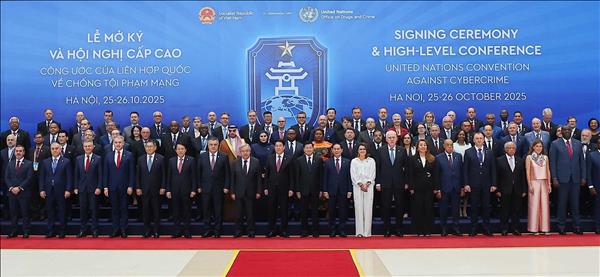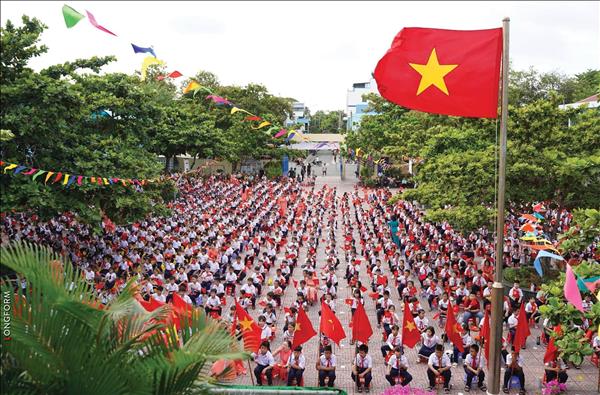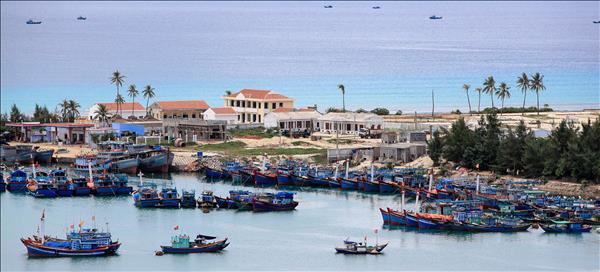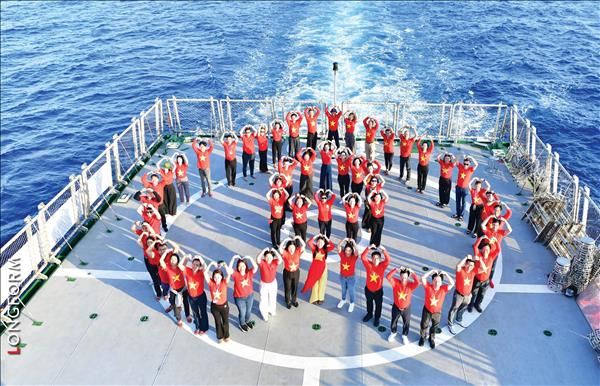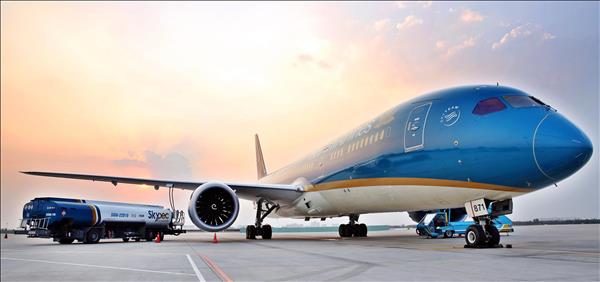On the occasion, Deputy Foreign Minister Le Hoai Trung gave an interview to the press. Below are the details of the interview.
- What is the significance of President Tran Dai Quang's state visit to Japan?
Foreign Deputy Minister Le Hoai Trung: At the invitation of Japanese Emperor Akihito and Empress Michiko, President Tran Dai Quang, his spouse and a high-ranking delegation paid a state visit to Japan from May 29 to June 2.
This was the first state visit of President Tran Dai Quang to Japan. The visit was paid when the two countries were carrying out many activities to mark the 45th anniversary of their diplomatic ties.
Vietnam-Japan extensive strategic partnership is flourishing in all aspects with high political trust. Japan is a leading partner, being the largest provider of official development assistance (ODA), the second largest investor, the third largest tourism partner and the fourth largest trade partner of Vietnam.
The visit was successful with diverse activities. The Emperor, Empress, royal family, and government of Japan welcomed President Tran Dai Quang, his spouse and the Vietnamese delegation, the only State guests this year, in the highest rituals to a head of State with all respect.
Japanese Emperor Akihito and Empress Michiko met the Vietnamese President and his wife four times: at the welcome ceremony, the state banquet, the farewell meeting, and particularly the banquet to mark the 45th anniversary of Vietnam-Japan diplomatic ties.
During the visit, the Vietnamese President held talks with Prime Minister Shinzo Abe, issued the Vietnam – Japan Joint Statement, and met with the press. He also met with Speaker of the House of Representatives and Speaker of the House of Councilors, leaders of Japanese political parties, including the Komeito Party, Japanese Communist Party, and Liberal Democratic Party. He held dialogues with Japanese economic organizations, including Japanese Business Federation (Keidanren), Japan Chamber of Commerce and Industry (JCCI), Japan International Cooperation Agency (JICA), and Japan External Trade Organization (JETRO).
President Quang also attended and delivered a speech at an investment promotion conference participated by over 700 businesses from the two countries.
He visited Gunma prefecture, where about 7,000 Vietnamese people are living, and Koganei Seiki Co. Ltd, which specializes in manufacturing aircraft and formula one cars. There are 39 Vietnamese engineers working in the company.
He attended a banquet to mark the 45th anniversary of Vietnam-Japan diplomatic ties which was attended by the Japanese Emperor and Empress, hundreds of Japanese guests being ministers, political party leaders, parliament members, local leaders, and representatives of economic groups and friendship organizations.
President Quang’s talks and meetings with Japanese Prime Minister Shinzo Abe and Japanese leaders were successful with the issuance of the Vietnam – Japan Joint Statement, setting major orientations for bilateral ties in the new development period. The two sides signed and exchanged four cooperation agreements in the fields of environment, construction and training, and 17 investment licenses and cooperation deals between businesses and localities in aviation, retail, agriculture, information technology, energy, and support industry worth nearly 2 billion US dollars.
- What are the outstanding outcomes of this visit?
Foreign Deputy Minister Le Hoai Trung: First, the visit has strengthened high political trust, tightened close ties with the Japanese royal, government, parliament, political and economic circles.
Emperor Akihito, Prime Minister Abe, parliament leaders, politicians and economists affirmed that they consider Vietnam an important partner in their country’s policy towards the region. They expressed readiness to cooperate for the sustainable development of Vietnam.
Second, the two countries’ leaders vowed to push the bilateral extensive strategic partnership into a new development period, and maintain regular exchanges with high-level leaders. In 2017, five high-level visits were paid, which were the first visit of Japanese Emperor Akihito and Empress Michiko to Vietnam, Japanese Prime Minister Shinzo Abe’s two visits to Vietnam, the visit of Speaker of Japanese House of Representatives Tadamori Ohshima to Vietnam, and Prime Minister Nguyen Xuan Phuc’s visit to Japan.
- What is the significance of President Tran Dai Quang's state visit to Japan?
Foreign Deputy Minister Le Hoai Trung: At the invitation of Japanese Emperor Akihito and Empress Michiko, President Tran Dai Quang, his spouse and a high-ranking delegation paid a state visit to Japan from May 29 to June 2.
This was the first state visit of President Tran Dai Quang to Japan. The visit was paid when the two countries were carrying out many activities to mark the 45th anniversary of their diplomatic ties.
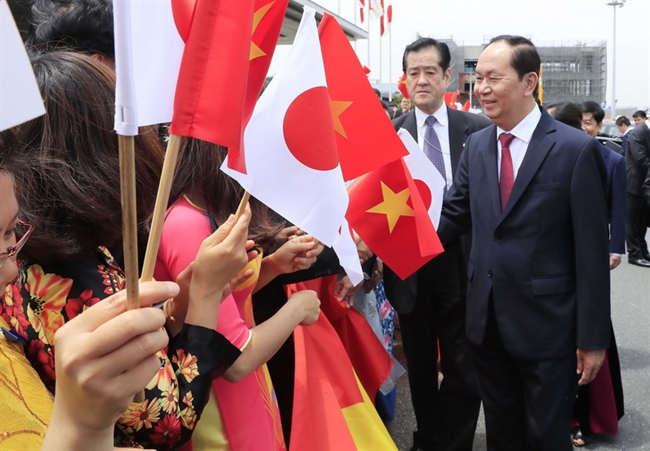 President Tran Dai Quang arrived in Tokyo on May 29, starting the state visit to Japan. Photo: Nhan Sang / VNA 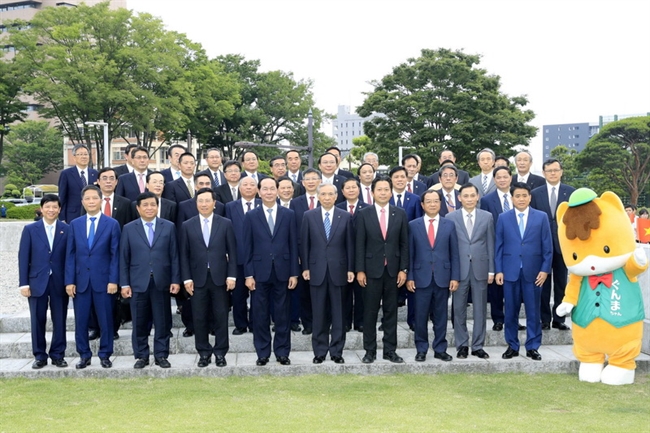 The Vietnamese President visited Gunma prefecture on May 29. In the photo: President Quang and his delegation pose with Governor Masaaki Osawa and officials of Gunma prefecture. Photo: Nhan Sang / VNA 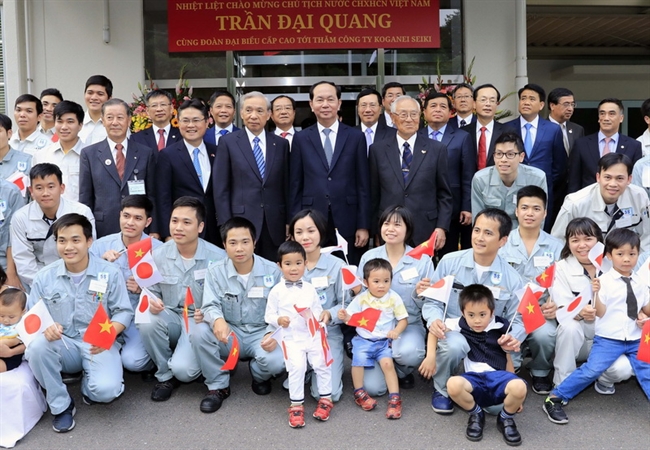 The Vietnamese leader poses with the managerial staff and Vietnamese workers of Koganei Seiki Co. Ltd. Photo: Nhan Sang / VNA |
Vietnam-Japan extensive strategic partnership is flourishing in all aspects with high political trust. Japan is a leading partner, being the largest provider of official development assistance (ODA), the second largest investor, the third largest tourism partner and the fourth largest trade partner of Vietnam.
The visit was successful with diverse activities. The Emperor, Empress, royal family, and government of Japan welcomed President Tran Dai Quang, his spouse and the Vietnamese delegation, the only State guests this year, in the highest rituals to a head of State with all respect.
Japanese Emperor Akihito and Empress Michiko met the Vietnamese President and his wife four times: at the welcome ceremony, the state banquet, the farewell meeting, and particularly the banquet to mark the 45th anniversary of Vietnam-Japan diplomatic ties.
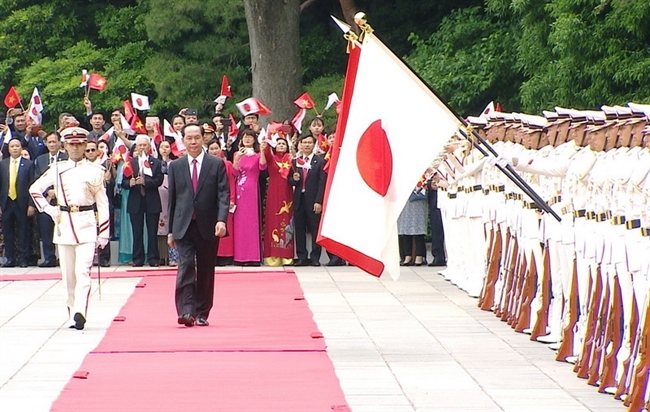 On May 30, a welcome ceremony was held for President Quang and his wife at the Imperial Palace in Tokyo. Photo: Nhan Sang / VNA 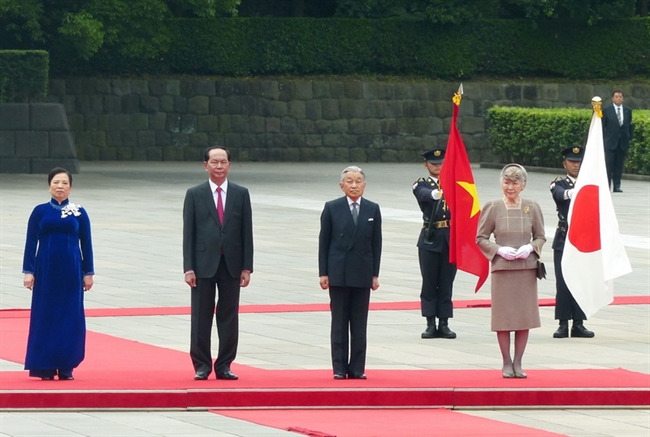 Japanese Emperor Akihito and Empress Michiko host the welcome ceremony. 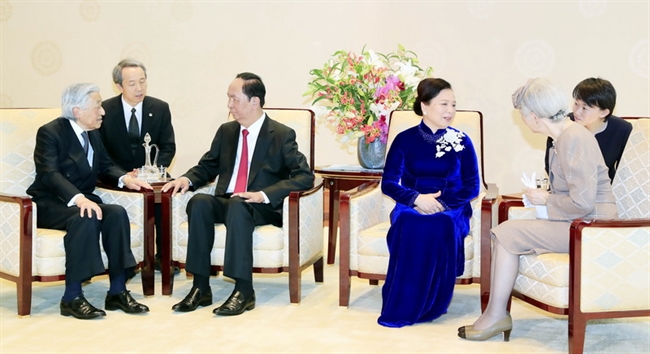 The Vietnamese President and his wife have a meeting with Emperor Akihito and Empress Michiko. Photo: Nhan Sang / VNA 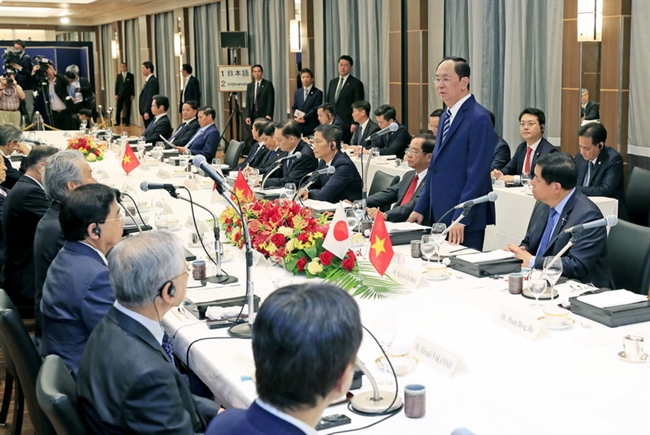 President Quang meets with Japan’s major economic groups. Photo: Nhan Sang / VNA 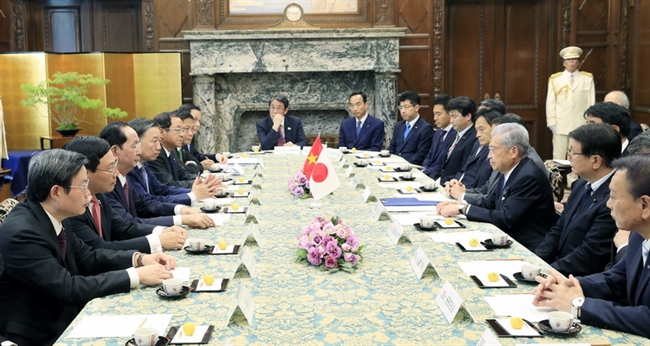 The Vietnamese President meets with Speaker of the Japanese House of Councilors Chuichi Date. Photo: Nhan Sang / VNA 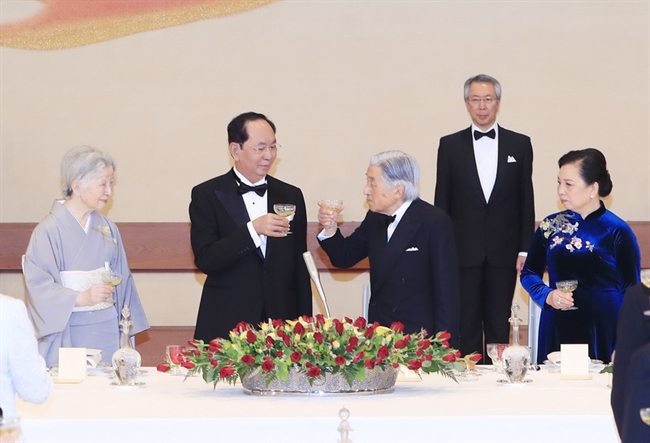 Emperor Akihito and Empress Michiko host a state banquet for President Quang, his wife and the Vietnamese high-ranking delegation. Photo: Nhan Sang / VNA |
During the visit, the Vietnamese President held talks with Prime Minister Shinzo Abe, issued the Vietnam – Japan Joint Statement, and met with the press. He also met with Speaker of the House of Representatives and Speaker of the House of Councilors, leaders of Japanese political parties, including the Komeito Party, Japanese Communist Party, and Liberal Democratic Party. He held dialogues with Japanese economic organizations, including Japanese Business Federation (Keidanren), Japan Chamber of Commerce and Industry (JCCI), Japan International Cooperation Agency (JICA), and Japan External Trade Organization (JETRO).
|
Japanese media coverage on President Tran Dai Quang’s visit
- NHK Television reported on Vietnamese President Tran Dai Quang’s visit to Japan as a state guest.
- The Tokyo newspaper reported on the Vietnamese President’s visit to Koganei Seiki Co., Ltd.
|
He visited Gunma prefecture, where about 7,000 Vietnamese people are living, and Koganei Seiki Co. Ltd, which specializes in manufacturing aircraft and formula one cars. There are 39 Vietnamese engineers working in the company.
He attended a banquet to mark the 45th anniversary of Vietnam-Japan diplomatic ties which was attended by the Japanese Emperor and Empress, hundreds of Japanese guests being ministers, political party leaders, parliament members, local leaders, and representatives of economic groups and friendship organizations.
President Quang’s talks and meetings with Japanese Prime Minister Shinzo Abe and Japanese leaders were successful with the issuance of the Vietnam – Japan Joint Statement, setting major orientations for bilateral ties in the new development period. The two sides signed and exchanged four cooperation agreements in the fields of environment, construction and training, and 17 investment licenses and cooperation deals between businesses and localities in aviation, retail, agriculture, information technology, energy, and support industry worth nearly 2 billion US dollars.
- What are the outstanding outcomes of this visit?
Foreign Deputy Minister Le Hoai Trung: First, the visit has strengthened high political trust, tightened close ties with the Japanese royal, government, parliament, political and economic circles.
Emperor Akihito, Prime Minister Abe, parliament leaders, politicians and economists affirmed that they consider Vietnam an important partner in their country’s policy towards the region. They expressed readiness to cooperate for the sustainable development of Vietnam.
Second, the two countries’ leaders vowed to push the bilateral extensive strategic partnership into a new development period, and maintain regular exchanges with high-level leaders. In 2017, five high-level visits were paid, which were the first visit of Japanese Emperor Akihito and Empress Michiko to Vietnam, Japanese Prime Minister Shinzo Abe’s two visits to Vietnam, the visit of Speaker of Japanese House of Representatives Tadamori Ohshima to Vietnam, and Prime Minister Nguyen Xuan Phuc’s visit to Japan.
They agreed to intensify exchanges between the two ruling Parties and legislatures, reinforce cooperation in national defense-security and maritime security, and defense technology and equipment.
The Japanese side vowed to continue assisting Vietnam in improving the capacity of legal enforcement at sea, search and rescue, peacekeeping mission, overcoming war consequences via war landmine clearance and provide support for Vietnamese victims of bombs, mines and dioxin.
They promised to step up joint work in human resources development, science-technology, environment, health care, education, culture and locality-to-locality cooperation.
The two sides committed to launching negotiations on the agreement on judicial assistance in criminal matters and the agreement on the transfer of sentenced persons.
Vowing to support Vietnam in administrative reform, Japan announced official development assistance worth nearly 150 million USD to improve vocational training capacity, and pledged to step up people-to-people exchange via welcoming more Vietnamese graduates and high-quality workers.
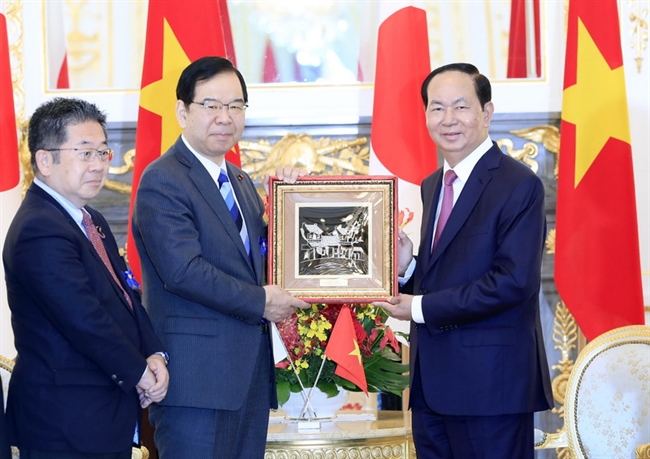 The Vietnamese President receives Chairman of the Japanese Communist Party Kazuo Shii. Photo: Nhan Sang / VNA 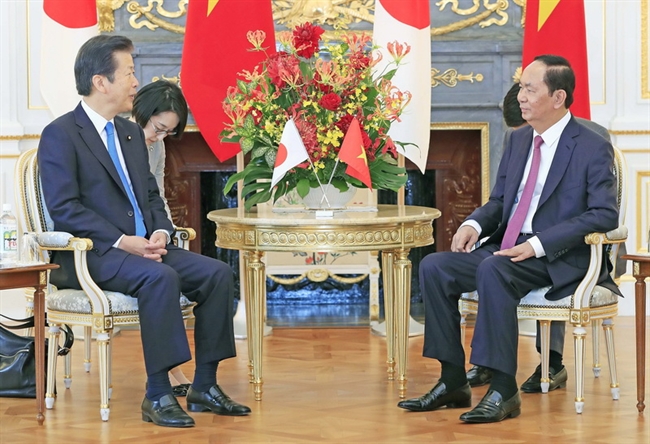 The Vietnamese leader has a reception for chairman of the Komeito Party Natsuo Yamaguchi. Photo: Nhan Sang / VNA 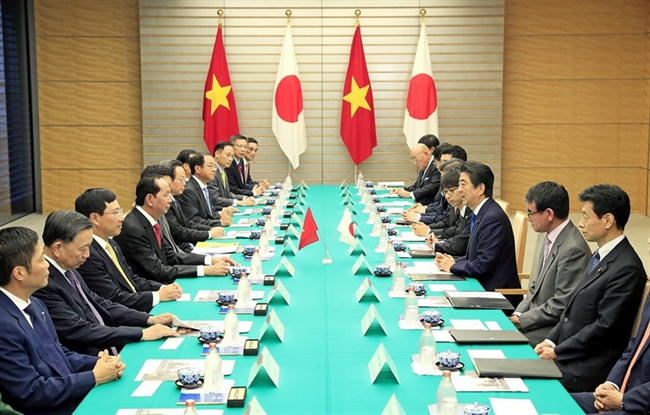 President Quang holds talks with Japanese Prime Minister Shinzo Abe. Photo: Nhan Sang / VNA 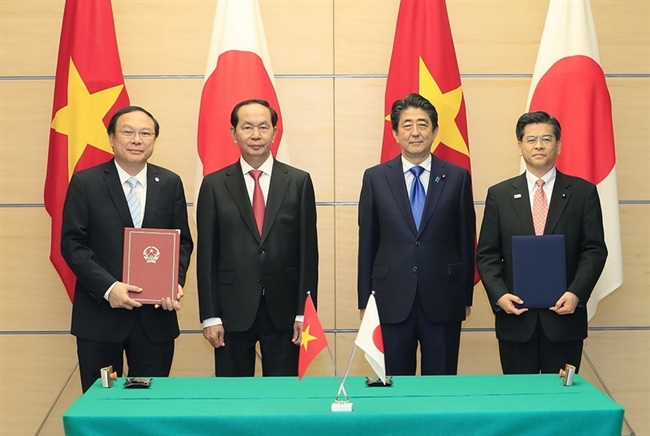 The two leaders witness the exchange of diplomatic notes between the governments of Vietnam and Japan for a 745 million yen grant for the 2018 scholarship program for human resource development and a Memorendum of Understanding on land, water resources, meteorology and geographical information. Photo: Nhan Sang / VNA 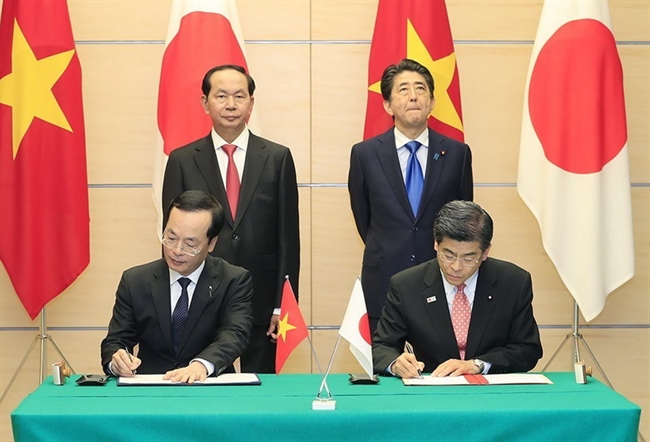 The Vietnamese President and Japanese Prime Minister witness the signing of a cooperation agreement on urban construction and development between Vietnam’s Ministry of Construction and Japan’s Ministry of Land, Infrastructure, Transport and Tourism. Photo: Nhan Sang / VNA 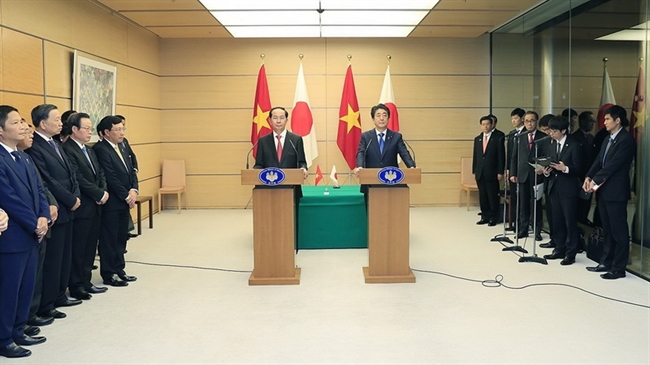 The two leaders hold a press conference to inform the results of their talks. Photo: Nhan Sang / VNA 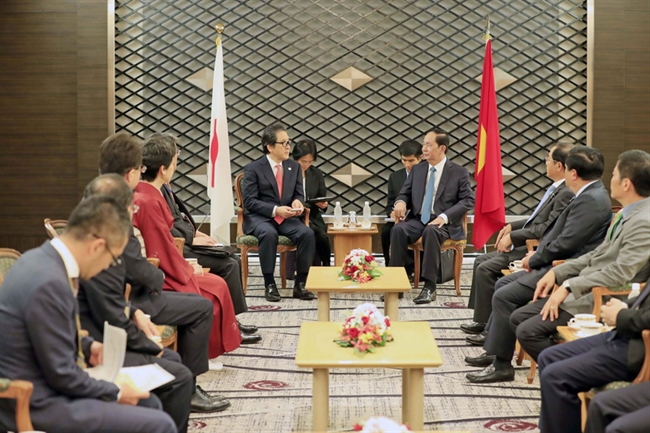 The Vietnamese leader receives Chairman of Japan External Trade Organization (JETRO) Hiroyuki Ishige in Tokyo. Photo: Nhan Sang / VNA 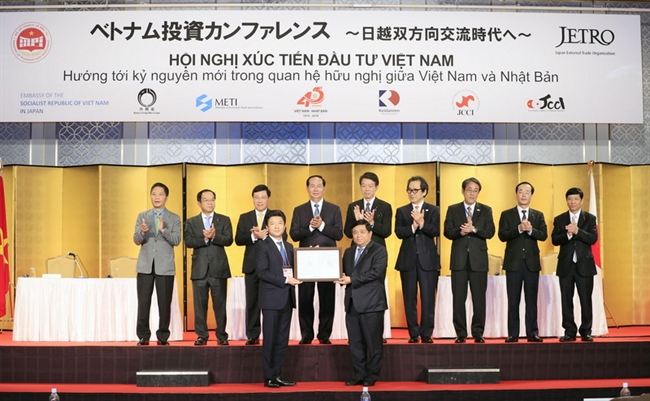 President Quang attended the investment promotion conference in Tokyo on May 31. In the photo: The ceremony to grant investment certificates and MoUs on cooperation between businesses of the two countries. Photo: Nhan Sang / VNA 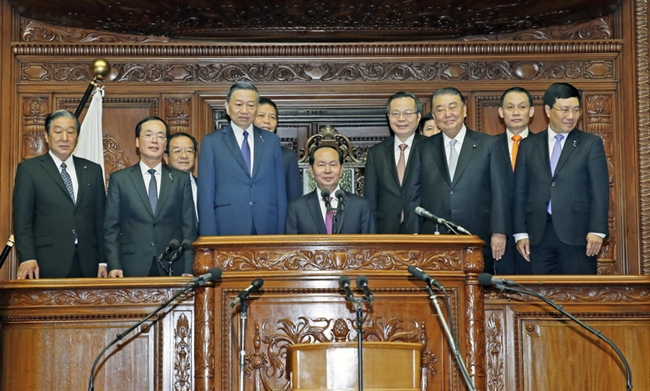 The Vietnamese President has a meeting with Speaker of Japanese House of Representatives Tadamori Ohshima. Photo: Nhan Sang / VNA 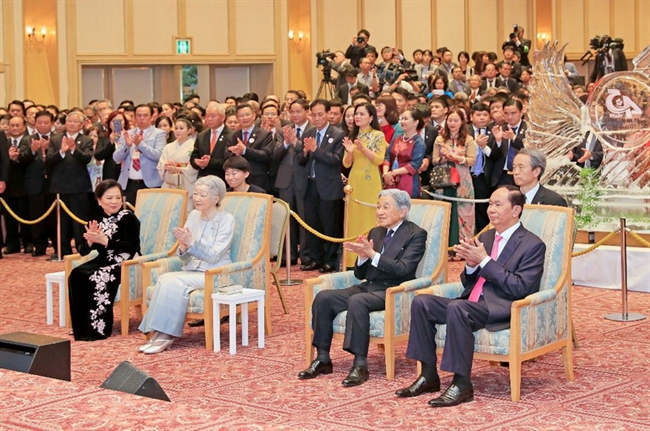 The Vietnamese President and his wife with the Japanese Emperor and Empress at the ceremony to mark the 45th anniversary of Vietnam-Japan diplomatic ties in. Photo: Nhan Sang / VNA 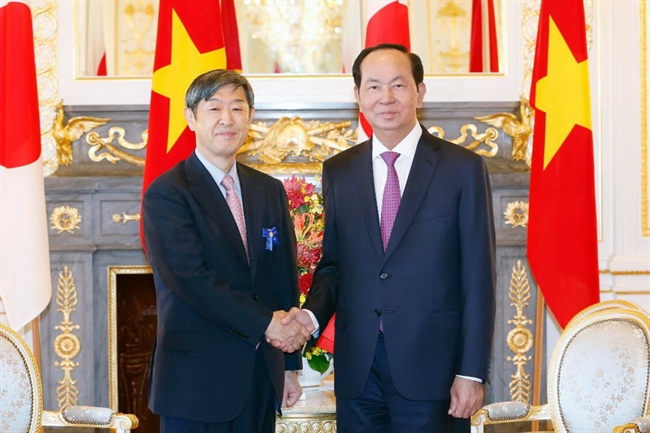 President Quang receives President of the Japan International Cooperation Agency (JICA) Shinichi Kitaoka. Photo: Nhan Sang / VNA 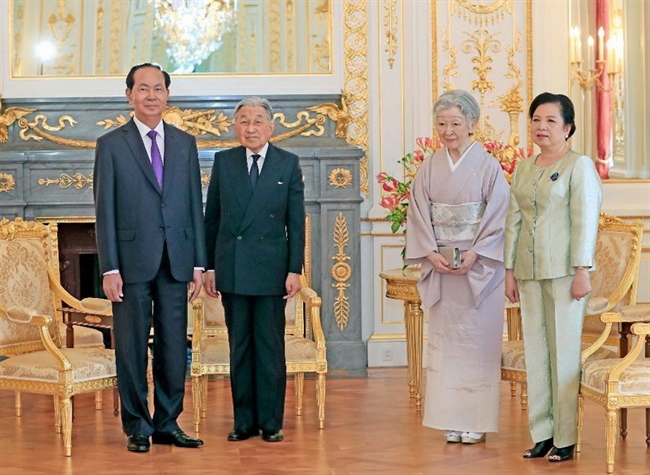 Japanese Emperor Akihito and Empress Michiko bid farewell to President Tran Dai Quang and his spouse on June 2. Photo: Nhan Sang / VNA |
Next, the two nations agreed to improve the efficiency of economic cooperation mechanisms to double 2014’s two-way trade value by 2020. They agreed to make it easier for Japanese oranges and Vietnamese litchis and longans to enter each other’s market.
|
Japanese media highlighted Vietnam-Japan cooperation in multiple areas: - The Nikkei newspaper: Vietnam and Japan agreed to expand the Comprehensive and Progressive Agreement for Trans-Pacific Partnership (CPTPP) to include more countries and regions for the future benefit of both nations. - NHK Television: The two sides exchanged concerns over the current situation in the East Sea and shared common awareness of the significance of fostering peace and stability in the waters and of the demilitarization through diplomatic efforts. |
They highlighted that Vietnam is an attractive business destination in ASEAN, and considered Vietnam a trustworthy and promising partner of Japan. They added that 70 percent of Japanese firms operating in Vietnam want to expand and do long-term business, invest in the equitisation of State-owned enterprises, build infrastructure, and partner in energy, high-tech agriculture and building an automated society.
Finally, the two sides vowed to offer mutual liaison at regional and global forums for peace, cooperation and development in the region and the world.
They attached importance to facilitating trade freedom and promoting the enactment of the Comprehensive and Progressive Agreement for Trans-Pacific Partnership, and expressed support for peace, stability and denuclearization on the Korean Peninsula.
The leaders of the two countries also declared mutual support for each other to run for a non-permanent member of the United Nations Security Council, with Vietnam for the 2020-2021 tenure and Japan for the 2023-2024 tenure.
Speaking highly of Vietnam’s role in the region, Japan affirmed its support to Vietnam’s stance on the East Sea issue. The two sides agreed on the importance of ensuring peace, security, navigation and aviation freedom and safety in the sea, and the peaceful settlement of disputes by peaceful means without the use of force or threat to use force, exercising self-restraint and avoiding all actions that would harm trust, and strictly abiding by international law, especially the 1982 UN Convention on the Law of the Sea (UNCLOS). They also underlined the need to respect diplomatic and legal processes, fully implement the Declaration on the Conduct of Parties in the East Sea (DOC), and strive to reach a framework of a Code of Conduct in the East Sea (COC) in a practical and effective manner with legal effectiveness.
With the practical outcomes achieved in President Tran Dai Quang’s state visit to Japan, I believe that 2018 will start a new, effective and practical development period of the Vietnam – Japan extensive strategic partnership./.
By VNA/VNP


